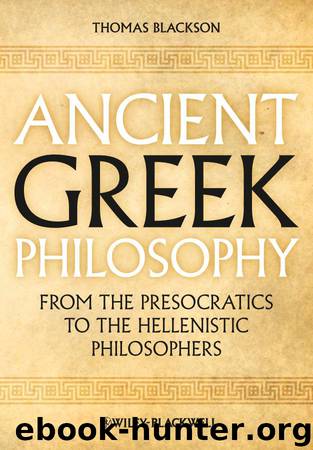1444335731 (PHSY) by Thomas A. Blackson

Author:Thomas A. Blackson
Language: eng
Format: azw3, epub
Publisher: Wiley
Published: 2010-11-29T22:00:00+00:00
5.2 Justice
The Republic itself continues. Glaucon and Adeimantus12 are not content to let the conversation end unsatisfactorily simply because Thrasymachus has thrown a fit. They challenge Socrates to demonstrate that Thrasymachus is mistaken about injustice and that despite what so many people think about injustice and happiness, the just life really is better than the unjust life.
Since Thrasymachus refuses to speak, Glaucon offers the challenge on his behalf. He suggests that justice is a device. Gluacon says that justice is a matter of the “laws and covenants” that allow human beings to escape the conflict endemic to the state of nature (II.358e–359b). In nature, all that deters a person from taking what he wants is his estimate of success. This leads to enough suffering that the many are convinced it would be better to make everyone respect the positions of others. If, however, someone could get away with breaking the law without being punished, then, as Thrasymachus maintained, he would live the best life of all. Prudence would not force him to respect the positions of others. Nothing would prevent him from getting “the most he can for himself, which is what by nature any natural being pursues as good” (II.359c).13
Socrates accepts Glaucon's challenge to “track down the nature of justice and injustice, and where the truth lay as regards the benefits of both” (II.368c). Justice in general is what is appropriate in connection with human beings, and Socrates suggests that he and his interlocutors should search for the appropriate in two domains: in the organization of human beings in cities, and in the organization of the parts of the human soul within the individual human being.
The Three Parts of the City
Socrates begins the search for justice in the city by first clarifying what a “city” is. He says no one is “self-sufficient” and that human beings arrange themselves into cities because each thinks that cooperation “is better for himself.” Each human being thus apparently assumes that some lives are better than others and that a city makes the better ones possible (II.369b–c).
The city must have a way to introduce and enforce rules to produce and distribute material goods and to encourage various forms of behavior. To produce the material goods, Socrates says that the city must have a working class. To introduce and enforce the rules of production and distribution, Socrates says that the city must have a governing or guardian class.
The guardian class has another job as well. The production and distribution of material goods is not the only behavior in the city. Socrates says that the guardian class is responsible for introducing and enforcing the rules that determine all forms of acceptable behavior, not just for introducing and enforcing the rules for the production and distribution of goods.
To produce the guardians, a certain system of education is necessary. Socrates describes this in detail, but the main points are these. The education begins with training in literature, whose content is highly restricted. Stories with falsehoods about the gods are not allowed.
Download
This site does not store any files on its server. We only index and link to content provided by other sites. Please contact the content providers to delete copyright contents if any and email us, we'll remove relevant links or contents immediately.
The remains of the day by Kazuo Ishiguro(8955)
Tools of Titans by Timothy Ferriss(8350)
Giovanni's Room by James Baldwin(7305)
The Black Swan by Nassim Nicholas Taleb(7091)
Inner Engineering: A Yogi's Guide to Joy by Sadhguru(6778)
The Way of Zen by Alan W. Watts(6580)
Asking the Right Questions: A Guide to Critical Thinking by M. Neil Browne & Stuart M. Keeley(5742)
The Power of Now: A Guide to Spiritual Enlightenment by Eckhart Tolle(5734)
The Six Wives Of Henry VIII (WOMEN IN HISTORY) by Fraser Antonia(5490)
Astrophysics for People in a Hurry by Neil DeGrasse Tyson(5171)
Housekeeping by Marilynne Robinson(4425)
12 Rules for Life by Jordan B. Peterson(4293)
Double Down (Diary of a Wimpy Kid Book 11) by Jeff Kinney(4253)
The Ethical Slut by Janet W. Hardy(4234)
Skin in the Game by Nassim Nicholas Taleb(4225)
Ikigai by Héctor García & Francesc Miralles(4222)
The Art of Happiness by The Dalai Lama(4117)
Skin in the Game: Hidden Asymmetries in Daily Life by Nassim Nicholas Taleb(3980)
Walking by Henry David Thoreau(3941)
